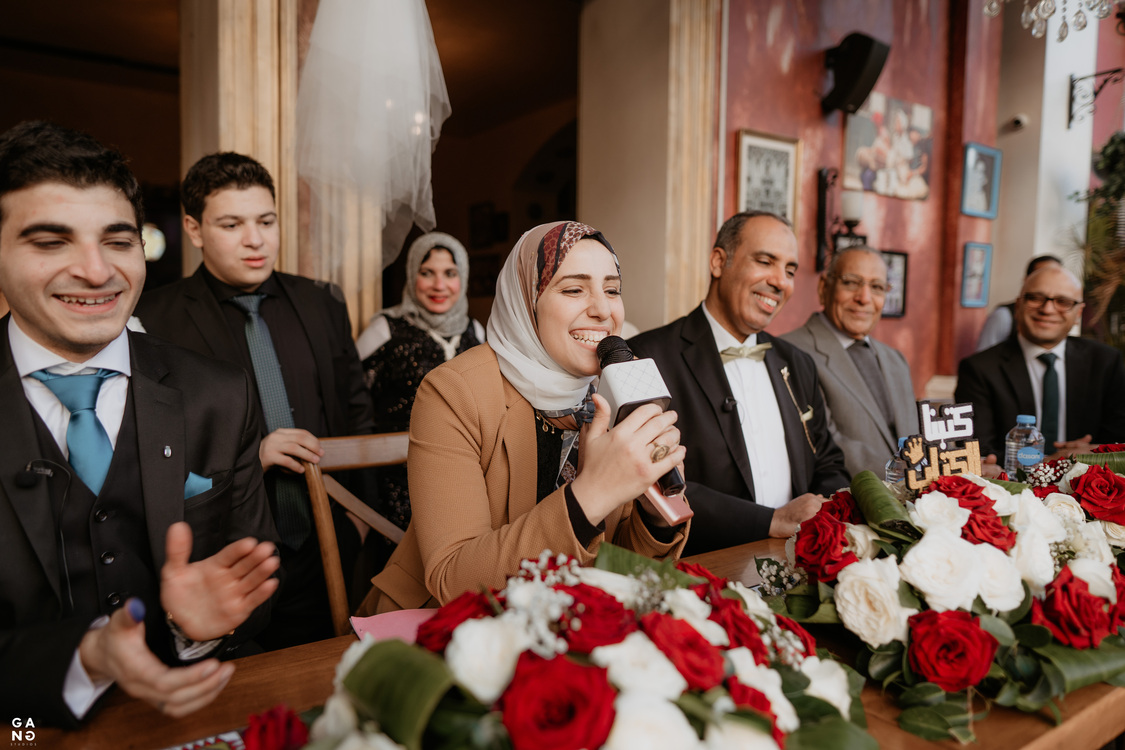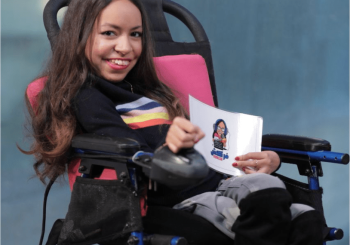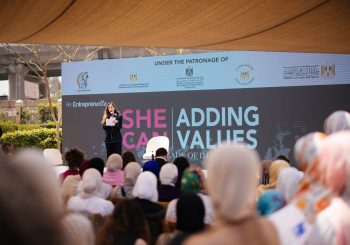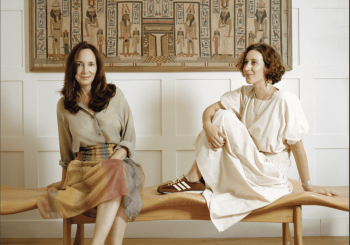In December 2020, Zeinab el Kawashti married a couple, Sondos and Karim, in front of their family and friends. In a different time and place, this would have been a normal occurrence, yet it was the first time any of the guests had seen a woman as a marriage officiant.
This is not odd, given that female Ma’azin (Muslim marriage officiants) are extremely rare.
The first-ever female marriage officiant in Egypt was Amal Soliman; she was hired in 2018 by the Egyptian family court and has since then married more than 300 couples. Many were inspired by Soliman, among them El Kawashti.
El Kawashti is a female M’azoun, a mother of three, and an Azhar Law and Religious Studies graduate.
Maz’oun work in depth
Buried in a tower on Faisal Street, in el Haram, is Zeinab el Kawashti’s humble shared office. On her desk is a name plaque with the engraving ‘Zeinab El Kawashti, Marriage officiant’.
The Ma’zoun job title is usually reserved for men, with a multitude of hurdles to jump through before even starting the process of legally becoming one. The family court has to hire them via court ruling, where they become eligible for their license – the process can take years.
“In the field, the cycle can be open for years. You can wait for your court judgment to become a Ma’zoun for 13 or 14 years. Thank God, my cycle only lasted two and a half years. There was even this one cycle that opened in 2009 and was just taken to court in 2021,” El Kawashti states.
To become a Ma’zoun in Egypt, one must have at least a Bachelor’s degree. Ma’azin are restricted to their jobs as officiants, with no further commitments. There are around 45 requirements to become a Ma’zoun in Egypt, including age. As of 2014, a Ma’zoun can only be between the ages of thirty and forty. The requirements also include maintaining optimal physical wellbeing.
“Priority is given to Azhari’s upbringing and Hanafi thought. Priority is also given to holders of higher degrees, such as masters, Ph.D., and Bachelors, ” comments El Kawashti.
El Kawashti started her journey years ago, yet she earned her title a year and a half ago. Other than Soliman, it was her brother, husband, and father – all ma’azin – who had inspired her to embark on this career.
“I like to be special, and I found this field special, unlike anywhere else. After graduating, I could’ve been a teacher, a lawyer, or any number of jobs. I found in this field something special that I wouldn’t have found anywhere else. There’s also the fact that my father and brother are both ma’azin. I was raised in this field, so I loved it,” she explains.
Her family, however, held reservations regarding her decision. She had to take it upon herself to convince them.
“I struggled a lot. As soon as I told them I wanted to become a Ma’zoun, they kept telling me there was no such thing as a woman Ma’zoun. I said, No, guys, there are women Ma’azin. Then, by coincidence, I went on YouTube and found the female Ma’azin of Ismaelya. So, I told them, here, there are female Ma’azin. I went to the court that I’m linked to and saw if there were any hiring cycles open for women Ma’azin at the time, and, by pure coincidence, there was one,” narrates El Kawashti.
The smiling and vibrant maz’ouna adds that most of the support she’s gotten over the years was from outside her social circle. She states, “My first supporter was Dr. Maya Morsi [president of the National Council of Women]. That was my first contract. At a wedding where Dr. Maya Morsi was present, she supported and encouraged me. From here on, I found a lot of support, and then I started working. ”
Eliciting mixed reactions: from ambiguity to encouragement
She adds that despite the support, many were still unsure about her officiating their wedding, asking her to prove that the contracts she performs are valid, and some even calling Dar al Ifta to check the validity of her license. El Kawashti, however, isn’t discouraged. She sends them the proof they need and tries to reassure them.
On the other hand, she finds a niche clientele who ask for El Kawashti specifically because she’s a woman.
“Yes, they [clients] specifically picked me so many times. Of course, they have the intention of getting married, but they want a woman [officiating]. Most of the people I marry are that way. It’s not common for people to come into the office wanting whoever is available; most people want me specifically,” she admits.
A problem that El Kawashti, and many of her female colleagues face, however, is that some clients pick a female officiant just for the flair, to ‘create a show’ at their weddings. She adds that this is a trend she’s noticed over the more recent years.
Others pick women for the sake of functionality. When, for instance, a bride is Niqabi —the ‘Niqab’ is a garment worn by some Muslim women that cover the entire face, only showing the eyes— her family oftentimes asks for a woman to officiate. This is because marriage officiants have to see the bride’s face and match it with her national ID.
El Kawashti laments that there is little progress in how women are viewed within the field and that for progress to be present, society needs to start treating the female Ma’azin just like their male colleagues.
“I wish they’d give more chances to female Ma’azin. What’s the issue, for us to be in demand, just like men? What’s the problem with a woman performing a Katb Ketab? Let us be treated normally, like men in the field. That’s all. That’s all I wish for,” El Kawashti adds.
The young officiant admits that the field is not welcoming to newcomers.
According to El Kawashti, a lot of the difficulties women Ma’azin face are ones born out of misconceptions about the act of touching, in the katb ketab ceremony, in which the couple signs the marriage contract.
She recounts times when asked “How are you going to sit amongst men?” although the female officiant sees no issue.
Traditionally, in a katb ketab, the M’azoun sits on a table, between the father of the bride and the groom. During the ceremony, the Ma’zoun often places their hand over the hands of the father of the bride and the groom’s hands. El Kawashti indicates that, according to El Sharia law, hand placement is not an actual requirement. In fact, the Ma’zoun isn’t required to touch anyone. This is an Egyptian norm that became ingrained into the practice but doesn’t exist in theory.
El Kawashti, however, still hopes that with time and commitment, all will change. She is hopeful that female officiants can keep the path open for one another.
“It’s for her [a female officiant aspiring to work] to love what she’s doing before starting. Whether it is man-lead or not, you have to love what you do, so you succeed, enjoy it, and keep it going, as they say. It’s not just a job I have to do, it’s not just working, no, love your field, and you’ll shine,” El Kawashti advises, with bubbling enthusiasm.
El Kawashti lives by this message every day while continuing to her dream job in a field dominated by men.







Comment (1)
[…] […]